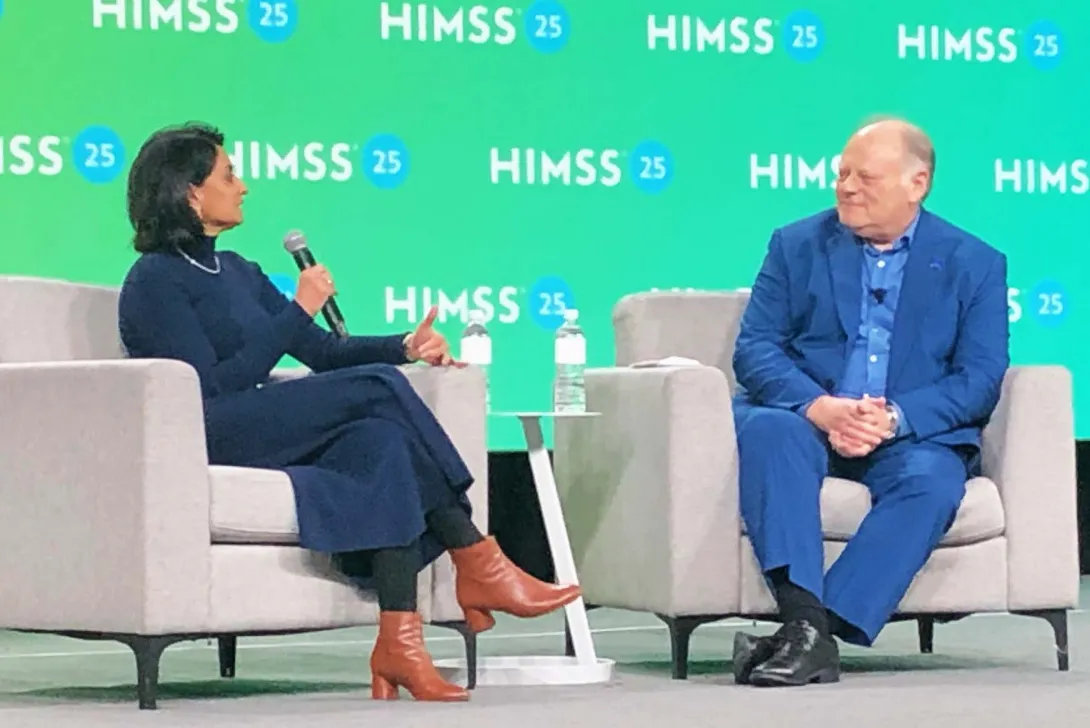
Seema Verma of Oracle Health speaks with HIMSS President and CEO Hal Wolf at HIMSS25.
Photo: Susan Morse/Healthcare Finance News/HIMSS
LAS VEGAS - Seema Verma, executive vice president and general manager of Oracle Health and Life Sciences, gave an update of her company's work on the U.S. Department of Veterans Affairs' Electronic Health Records Modernization project.
At HIMSS25 last week, Verma told HIMSS President and CEO Hal Wolf she is "excited about progress" of the largest implementation in the world with the Department of Defense.
Where it has been implemented, patient satisfaction has increased, she said.
The project aims to replace the VA's current Veterans Health Information Systems and Technology Architecture (VistA) with a modern, interoperable EHR system.
In 2018, the Department of Veterans Affairs chose Cerner to implement the EHR system with the reported goal of making it interoperable with the Pentagon's health record system. In 2022, Cerner was bought by Oracle. The $28.3 billion deal was first announced in 2021.
However, delays and outages have plagued implementation.
Last week, VA's Oracle Health EHR experienced a widespread outage.
The U.S. Department of Veterans Affairs, along with other agencies using federal EHRs, experienced a system outage just weeks after assuring lawmakers about the success of ongoing improvement efforts.
The problems have been a management issue, not a software issue, Verma told Wolf.
Conversations on Capitol Hill last month centered on delays while the Government Accountability Office added three new recommendations for cost estimating, schedule and system metrics, bringing its total recommendations to 18.
In 2024, the VA extended its contract with Oracle Health for 11 months.
Complete deployment of the EHR at all VA medical facilities is expected in 2031.
Verma told lawmakers in February the company is in the process of migrating the Oracle Health EHR to the cloud. The first phase will be completed later this year, and the company anticipates full migration of the EHR to the cloud to be completed next year.
The VA also recently announced the deployment of the Oracle Health EHR to nine additional sites next year.
Verma discussed artificial intelligence, which she said is in the design of Oracle. This spring, Oracle will launch a product on longitudinal health records using data from wearables and other digital devices, she said. This data will be layered by AI.
Wolf asked about any issues with data sharing, saying there seems to be a retreat back to hesitation over the view that data is sovereign.
Oracle will build the infrastructure for data sharing, Verma said, but it's up to countries, providers and patients to decide whether that data is shared.
Verma served as the administrator of the Centers for Medicare and Medicaid Services from 2017 to 2021.
Her work at Oracle is a continuation of her work at CMS on interoperability, she said.
But Oracle is not just an EHR company, Verma said.
Oracle's work in healthcare extends to clinical research and care. But the problems of healthcare won't be solved without payers, she said. The vast sets of data and applied AI must all come together, she said.
Wolf asked about what's currently going on in Washington.
Even during Trump's first administration, the president was "committed to addressing big issues and big problems," said Verma, who worked for CMS during the first administration. Now, she said, he's "even not more afraid. He's not running for another term."
The larger issue is the financial solvency of the country, she said.
"What is fueling the deficit is our healthcare system, at a rate that is unsustainable," she said.
She added, technology is playing a role in lowering the cost trajectory.
Email the writer: SMorse@himss.org